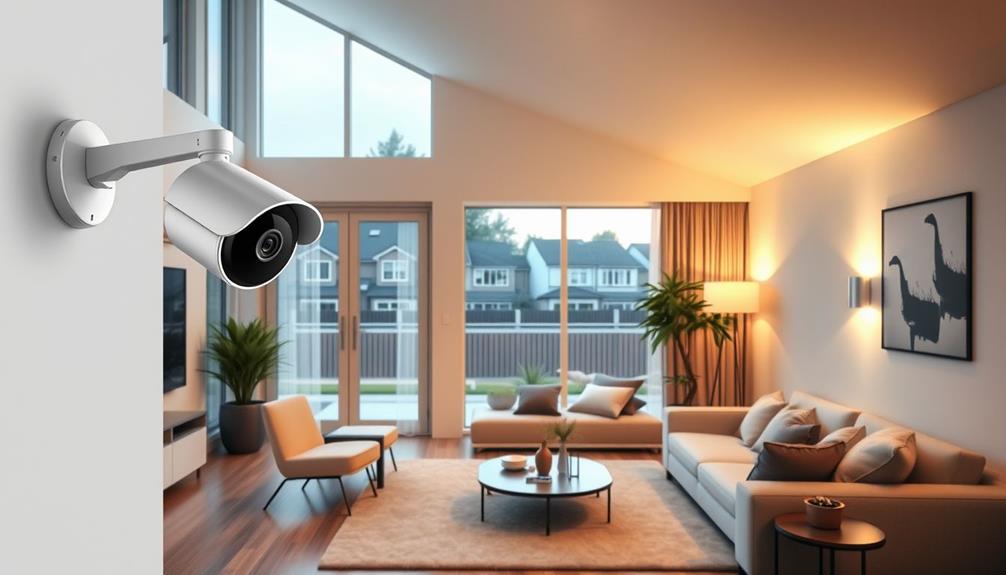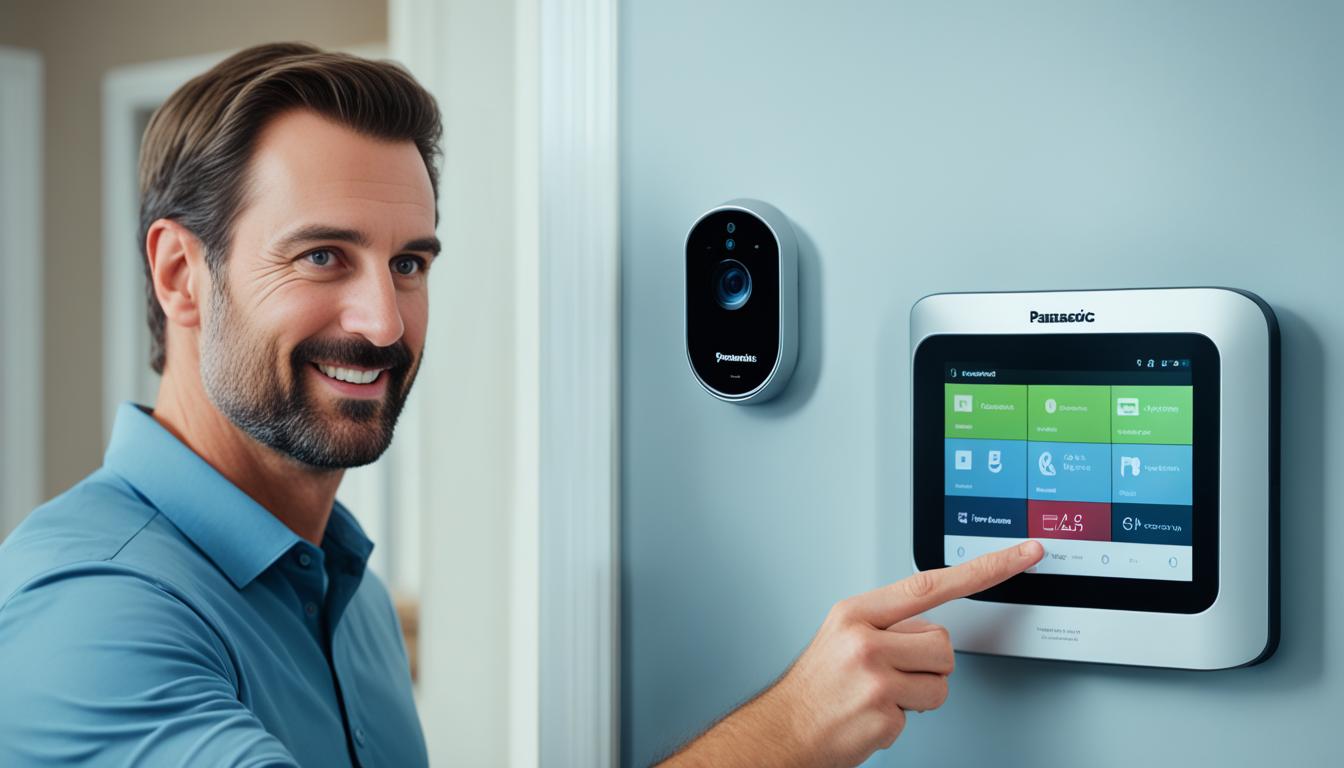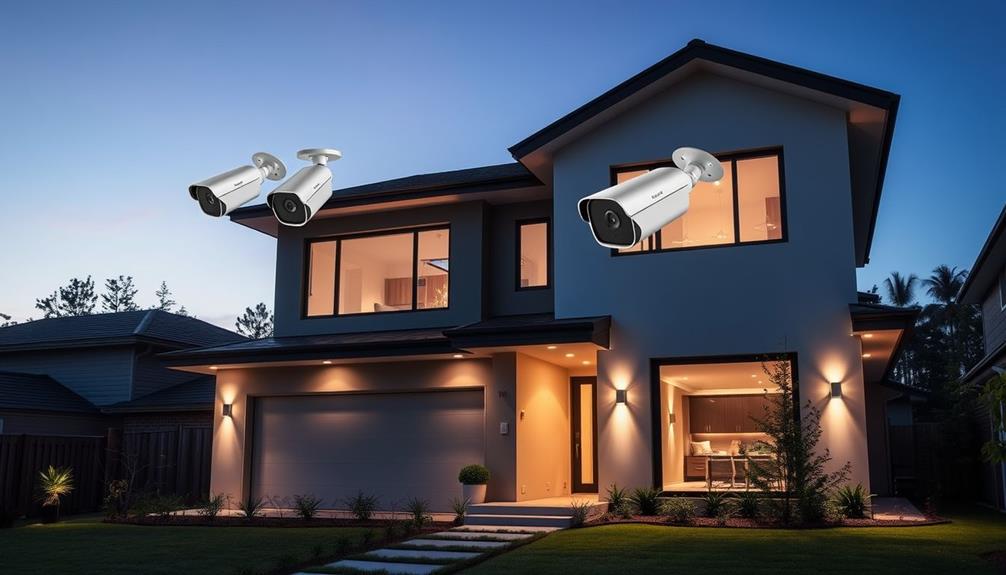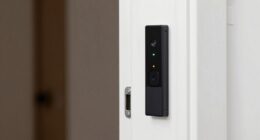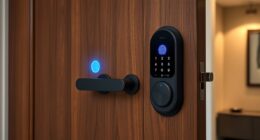Have you realized that security systems have become more budget-friendly in the past five years? This development gives homeowners various choices in the expanding home security market. Options range from basic alarms to intricate smart home setups. Understanding the advantages and disadvantages is crucial for making a smart decision. **Major perks** include enhanced safety, peace of mind, and potential savings of up to 20% on homeowner’s insurance; however, drawbacks consist of the initial investment and the necessity for routine upkeep.
In this section, we discuss the various aspects of home security. This will help you balance the benefits and drawbacks. Then you can decide if investing in a system is right for your home and family’s safety.
Key Takeaways
- Home security systems offer safety enhancements and peace of mind.
- Potential discounts on homeowner’s insurance make systems financially attractive.
- Ongoing maintenance and installation costs must be considered.
- Understanding the types of systems available helps in making the right choice.
- Smart features can integrate energy savings with security.
Understanding Home Security Systems
It’s crucial to know what home security means to protect your home. Home security systems are made up of different devices. They stop break-ins, theft, and other emergencies. These systems keep people and their homes safe and secure.
Definition and Purpose
Home security aims to reduce the risks of break-ins and emergencies. These systems scare off criminals and make families feel safe. If someone tries to break in, alarm systems will alert you. You can then quickly do something to keep your home safe. Self-monitored systems get rid of extra costs for security services2. However, monitored systems keep an eye on your home all the time. They also quickly send help if there’s an emergency, giving you more protection2.
Types of Home Security Systems
Selecting the right home security system is important. There are several types, including:
- DIY Systems
- Professional Systems
- Wired Systems
- Wireless Systems
- Smart Systems
- Local Only Systems
Each kind has its pros and cons. For example, self-monitored systems need WiFi to work2. Wireless systems link to smart home tech, improving ease of use and control3. Moreover, these systems can have cameras, motion and entry sensors, and smart locks3.
Monitoring options can be very different. Some systems offer monitoring all the time. Others don’t have service fees but need you to handle alerts on your own2. Think about the cost and what features you need when choosing3.
| Type of System | Monitoring | Cost | Key Features |
|---|---|---|---|
| DIY System | No professional | Low | Self-monitored, customizable |
| Professional System | 24/7 monitoring | Higher | Fast emergency response |
| Wired System | Can include professional | Medium | Reliable, less prone to interference |
| Wireless System | Varies | Medium | Smart home integration |
| Smart System | Can include professional | Higher | Remote monitoring with apps |
Benefits of Home Security Systems
Discovering the perks of home security systems can change how you view your safety. These systems bring you peace and boost your home’s defense.
Peace of Mind
Happiness comes with knowing your home is always watched over. Visible security can scare off bad guys, ensuring your home stays safe. Studies show that 80% of burglars look for alarms first; 60% would pick another house if they see one4.
Protection Against Crime
A security system greatly helps in fighting against crime. Each year, the U.S. sees over 885,000 home burglaries, causing big losses4. A burglar alarm could lower the chances of your home being chosen. In areas with alarms, crimes often drop, proving these systems scare criminals away4.
Insurance Premium Discounts
Security systems can save you money on insurance too. With a system in place, discounts on premiums can range from 5% to 20%5. This savings is another great reason to get home security.
Home Automation Features
Today’s security systems include cool home automation. You can control security, lights, and more, all from your phone5. This not only makes your home safer but also more modern and convenient.

What home security system do you use? Pros and cons?
When picking a home security system, it’s key to look at both pros and cons. Every system has good and bad points. Knowing these can help you choose wisely.
Pros of Using a Home Security System
- It makes you and your family safer and more at ease.
- It scares off burglars, reducing the risk of break-ins.
- You might save money on your homeowner’s insurance.
- You get cool features like controlling your house with your phone, watching video feeds, and getting alerts for emergencies.
Cons of Using a Home Security System
But, there are downsides too. Here are some things to think about:
- Starting costs for equipment and setup can be high.
- There are monthly fees to keep in mind.
- Mistakes can set off the alarm, which is annoying and might cost you.
- You have to remember to turn it on and off.
Tips for Choosing the Right System
How do you pick the right system? Start by thinking about what you need:
- Look at reviews for different companies, like Vivint (4.5/5), ADT (4.25/5), and SimpliSafe (4.25/5)6.
- Look for deals like Cove, at $17.99/month with a big discount6.
- Think about what features you want, such as using your phone to control things, easy setup, and good customer service.
- Watch for sales and special deals from providers.

| Security System | Rating | Starting Price/Month | Notable Features |
|---|---|---|---|
| Vivint | 4.5/5 | $29.99 | Smart Deter lurker detection technology |
| ADT | 4.25/5 | $28.99 | Free Google Nest Doorbell installation |
| SimpliSafe | 4.25/5 | $19.99 | No contracts, 60-day trial period |
| Cove | 4/5 | $17.99 | 50% discount, free HD camera |
Understanding the pros and cons of home security systems guides you to a smart choice that fits your needs well7.
Cost Considerations
It’s important to think about the cost of getting a home security system. These costs can affect your budget now and later. Knowing what you’ll spend is key to choosing the best system for your needs.
Initial Investment and Monthly Fees
Home security systems have a wide price range based on their features. A simple system might cost between $200 and $300 for the equipment alone8. Choosing a more advanced system with 24/7 monitoring could cost up to $4,5009. The starting price for systems can be from $280 to $1,150, depending on their tech9. Monthly fees for this monitoring can be from $10 to $60, which adds up over time8.
Evaluating Long-Term Value
Consider the long-term benefits of a security system, like insurance discounts. These discounts can save you money over time, making upfront costs more manageable9. Also, be aware of extra costs like activation fees, which are $25 to $100. There might be yearly fees for alarm permits too, costing $25 to $1009. Plus, the annual fee for advanced monitoring can be around $800. Be clear about the costs you’re committing to9.

Understanding the initial and monthly costs will help you see the long-term value of a security system. Remember to consider additional expenses for upgrades or extra parts, which could cost $25 to $300 each9.
Installation and Maintenance Challenges
Installing security systems can be tricky for homeowners. You can pick DIY installation or get professional help. Each choice has its good points. Knowing the differences helps you choose what’s best for you.
DIY vs. Professional Installation
Going for DIY home security saves money. It lets you install the system yourself, which is nice if you’re tech-savvy. But, it takes time and can be hard if you’re not used to the tech. On the other hand, professional installation means your system will be set up right. This is good for tricky or big setups, or if you need wired parts. Hiring pros ensures everything works well and stays reliable10.
Regular Maintenance Requirements
Keeping your security system in check is crucial. Regular checks keep sensors, alarms, cameras, and batteries working right10. This helps avoid false alarms and makes your gear last longer11. You should do things like battery checks and tests often. Every month, look at your motion sensors and alarms. Every three months, check the audio and video parts10. Doing this keeps your security top-notch, protecting you better11.

Conclusion
When thinking about a home security system, understanding its pros and cons is key. Knowing your home is safe brings peace of mind, really valuable for families or those often away. These systems can also cut down on insurance costs because of reduced risk, making them a smart choice12. Yet, it’s wise to think about the installation costs and monthly monitoring fees13.
There are some issues to consider, like false alarms and privacy worries with camera use14. Knowing these can help you pick the right security for your home. You might go for a classic system or a modern one that’s easy to use12.
To sum up, deciding on a home security system involves many factors. Considering your needs, the benefits, and any downsides helps you make the best choice. This keeps your family safe and gives you calmness13.
FAQ
What are the main benefits of having a home security system?
What are the drawbacks of home security systems?
How much does it cost to install and monitor a home security system?
What Are the Potential Downsides of Installing a Home Security System?
When considering how to secure your home, it’s important to weigh the potential downsides of installing a home security system. Some drawbacks may include the cost of the system, false alarms causing inconvenience, and potential privacy concerns with surveillance cameras. It’s important to carefully consider all factors before making a decision.
FAQ
What are the main benefits of having a home security system?
Home security systems offer peace of mind and keep crime away. They watch your home all the time. This can stop thefts and makes sure your family and things are safe.
What are the drawbacks of home security systems?
Home security systems are great but have some downsides. The initial cost and monthly fees can add up. Also, false alarms might happen, causing a bit of trouble.
How much does it cost to install and monitor a home security system?
The cost for home security varies. Starting costs can be about 0, with top setups over
FAQ
What are the main benefits of having a home security system?
Home security systems offer peace of mind and keep crime away. They watch your home all the time. This can stop thefts and makes sure your family and things are safe.
What are the drawbacks of home security systems?
Home security systems are great but have some downsides. The initial cost and monthly fees can add up. Also, false alarms might happen, causing a bit of trouble.
How much does it cost to install and monitor a home security system?
The cost for home security varies. Starting costs can be about $400, with top setups over $1,000. Monthly fees for monitoring are between $9 to $60, based on the service level.
Can I install a home security system myself?
Yes, DIY installation is an option to save money. It needs some tech skills and time. On the other side, paying more for professional setup ensures everything is right.
What types of home security systems are available?
There are many home security options. Choices include wired and wireless systems, DIY or professional monitoring. Smart systems with mobile alerts and remote watching are getting popular.
How does a home security system help with insurance premiums?
Owners insurance may cost less if you have a security system. Many insurers give discounts. This can save a lot of money over time.
What maintenance does a home security system require?
Keeping your security system working well is important. Check batteries, test sensors, and update software regularly. Without this care, it might not work when you really need it.
How do I choose the right home security system for my needs?
Think about your budget, preferred tech, needed support, and wanted features. Balance the good and bad to pick what’s best for your home’s safety.
Can I install a home security system myself?
Yes, DIY installation is an option to save money. It needs some tech skills and time. On the other side, paying more for professional setup ensures everything is right.
What types of home security systems are available?
There are many home security options. Choices include wired and wireless systems, DIY or professional monitoring. Smart systems with mobile alerts and remote watching are getting popular.
How does a home security system help with insurance premiums?
Owners insurance may cost less if you have a security system. Many insurers give discounts. This can save a lot of money over time.
What maintenance does a home security system require?
Keeping your security system working well is important. Check batteries, test sensors, and update software regularly. Without this care, it might not work when you really need it.
How do I choose the right home security system for my needs?
Think about your budget, preferred tech, needed support, and wanted features. Balance the good and bad to pick what’s best for your home’s safety.


